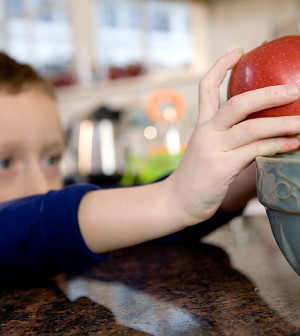- Could Artificial Sweeteners Be Aging the Brain Faster?
- Techniques for Soothing Your Nervous System
- Does the Water in Your House Smell Funny? Here’s Why
- Can a Daily Dose of Apple Cider Vinegar Actually Aid Weight Loss?
- 6 Health Beverages That Can Actually Spike Your Blood Sugar
- Treatment Options for Social Anxiety Disorder
- Understanding the Connection Between Anxiety and Depression
- How Daily Prunes Can Influence Cholesterol and Inflammation
- When to Take B12 for Better Absorption and Energy
- Epsom Salts: Health Benefits and Uses
Mental Illness Afflicts Many Juveniles in Jail


Hospitalization for mental health problems is far more common among kids behind bars than among children and teens in the general population, a new study finds.
Juvenile inmates also have longer hospital stays, which suggests they have more serious underlying mental health problems, according to the Stanford University School of Medicine researchers.
“We know young people in the juvenile justice system have a disproportionate burden of mental illness, but I was really surprised by the magnitude of the problem, because hospitalizations typically occur for very severe illness,” lead author Dr. Arash Anoshiravani, a clinical assistant professor of adolescent medicine, said in a university news release.
The researchers analyzed nearly 2 million hospitalizations of children and teens in California over the age of 15. They found that mental health disorders accounted for 63 percent of hospitalizations among juvenile inmates, compared to 19 percent for those not in jail.
The study was published online July 21 in the Journal of Adolescent Health.
Mental health hospitalizations were more common among detained girls than boys. “If you just looked at girls, 74 percent of their hospitalizations were for mental illnesses. That’s pretty sobering,” Anoshiravani said.
Average hospital stays for mental health problems were longer for juvenile inmates than for youngsters not in jail — six days versus five days. The most common mental health diagnoses in both groups were depression, substance abuse and conduct disorders.
Many juvenile inmates’ mental health problems are the result of stressful and traumatic childhood experiences, such as being abused or witnessing violence, Anoshiravani said.
“They’re regular kids who have had really, really horrible childhoods,” he noted.
“We are arresting kids who have mental health problems probably related to their experiences as children,” Anoshiravani said. “Is that the way we should be dealing with this, or should we be getting them into treatment earlier, before they start getting caught up in the justice system?”
More information
The U.S. Centers for Disease Control and Prevention has more about children’s mental health.
Source: HealthDay
Copyright © 2026 HealthDay. All rights reserved.










